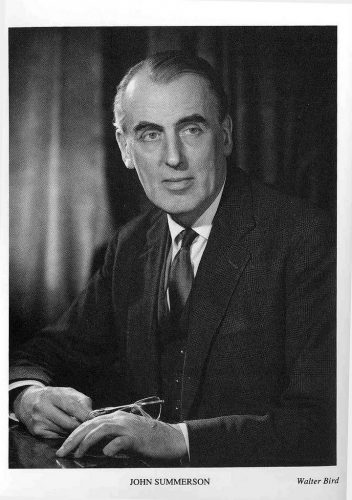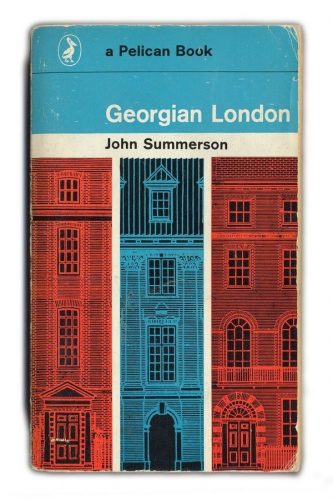
London has never been planned. Beside other eighteenth-century capitals, London is remarkable for the freedom with which it developed. It is the city raised by private, not by public, wealth; the least authoritarian city in Europe. Whatever attempts have been made to overrule the individual in the public interest, they have failed. Elizabeth and her Stuart successors tried bluntly to stop any expansion whatever. They failed. Charles II and his pet intellectuals tried to impose a plan after the Great Fire. They failed. Nearly every monarch in turn projected a great Royal Palace to dominate at least part of his capital. All failed until George IV conspired with Nash to cheat Parliament into rebuilding Buckingham House, scoring no triumph in the process. The reasons for all this are embedded deep in England’s social and political history. London is one of the few capitals where church property and church interests have not been an overriding factor; where Royal prestige and prerogative in building matters have been set at naught; where defense has never, since the Middle Ages, dictated a permanent circumvallation to control the limits of development. London is above all a metropolis of merchandise. The basis of its building history is the trade cycle rather than the changing ambitions and policies of rulers and administrators. The land speculator and the adventuring builder have contributed more to the character of the Georgian city than the minister with a flair for artistic propaganda, or the monarch with a mission for dynastic assertion.
From Georgian London, by John Summerson
In the introduction Summerson engages in some classic English understatement: “This book originated in a series of of lectures prepared for the Courtauld Institute in 1939, but not delivered owing to the turn of events.” He then mentions that he was unable to finish the book during the war: “The whole period has, of course, been somewhat unpropitious for a book of this sort. The subject matter has been bombed from time to time and any papers, plans and drawings of whose existence I was aware have been totally inaccessible.”

“eightieth-century capitals”? Have I been asleep? ;-)
— Fixed. Thanks. — Lex
“The reasons for all this are embedded deep in England’s social and political history. London is one of the few capitals where church property and church interests have not been an overriding factor…”
Sigh. The English Reformation really was the greatest social and cultural disaster of the last 500 years. A Catholic England would have prevented all the nonsensical claims that the successes of Britain and America are somehow due to Protestantism, and that Catholicism is equivalent to the centralized politics of the France, Spain, etc.
PS. I want that book, just as a piece of art, regardless of the content.
Or perhaps a Catholic England would have prevented all the successes of Britain and America.
London has seen its last days as “one of the few capitals where church property and church interests have not been an overriding factor”¦”
Except the churches are mosques. It may survive for a decade or two as a place where people go to make money, predominantly men as women will gave a hard time in a Muslim city, and leave as soon as they have enough.
Macron has been handed an opportunity by the British voters and he might be able to take advantage of it.
Macron was an investment banker at Rothschild from 2008 to 2012.
That gig hands his critics a talking point. Le Pen has portrayed him as the “candidate of finance,” though Macron has countered that he “learnt a job; every political leader should have one,” as a Financial Times report noted.
Check out: Bank stocks ride high after Macron wins first round
Also, he may try to do something about the labor laws that kill the French economy.
Mr. Macron is trying to revise more than 3,000 pages of labor rules that employers say discourage hiring by making it complicated and financially risky to dismiss workers. His proposals include capping fines for unfair dismissals and giving companies more leeway to work around rules set by unions.
“The world is changing and it’s changing fast,” said Labor Minister Muriel Pénicaud, who used to head human resources at French dairy company Danone SA. “We are obliged to change our social model.”
If he can do it at the same time the Muslims are taking over London, “the French Silicon Valley” may move back to Paris.
“a Catholic England would have prevented all the successes of Britain and America.”
It has been said that “The Enlightenment moved to England with the Huguenots.”
Nope. Culturally England in 1500 was the same as in 1600, when it came to anything that mattered for its success, no matter what Protestant/Anti-Catholic historians say in their attempts to justify the destruction of their religious heritage.
“I want that book, just as a piece of art, regardless of the content.”
Postwar paperback books covers are a whole field of art history unto themselves, and the Penguin and Pelican book covers were often beautiful.
“Check out: Bank stocks ride high after Macron wins first round”
That didn’t last long. Soc Gen got hammered today, down almost 3%, and it’s down 10% from its post election high.
Brexit was thought to be a boon for European banks because of doubts about Pound Sterling value and the possibility of London’s European bankers and traders losing their passport rights. It looks like some of the banks may be moving to Ireland instead.
The worst part about Brexit is that it hasn’t happened yet. London financial services companies are harmed by the uncertainty.
Industrial production, on the other hand, is booming in ways that haven’t been seen in decades. This is fantastic news, and it’s proof that Brexit is the right course. London isn’t only bigger than the passing whims of rulers, but it’s also greater than fickle industries too used to being coddled and propped up by overgrown bureaucracies. For too long dragged around by Supranational committees with internationalist agendas, London will now rise up on the shoulders of its own people.
And now — in a single generation — it has been made majority non-British by its own government. Foreign killers slaughter Londoners and that same government bloviates about the need to protect our new diversity.
If I were a Brit I would be either eyeing my prospects abroad or very, very quietly arming myself.
Wasn’t it Chesterton who wrote something like the stumbling English drunkard made the rambling English roads?
“If I were a Brit I would be either eyeing my prospects abroad or very, very quietly arming myself.”
What I see is the middle class retiring to French villages and the wealthy retiring to south east England, like Chichester where my friends live.
When we were there in September 2015, the Goodwood Revival was going on. Two hundred thousand people attended and the tickets were 200 pounds per day. Everyone they knew was renting out rooms or their entire houses to visitors.
Chichester is a small city dating to Roman times, and we saw the streets filled with the typical English faces you used to see in London.